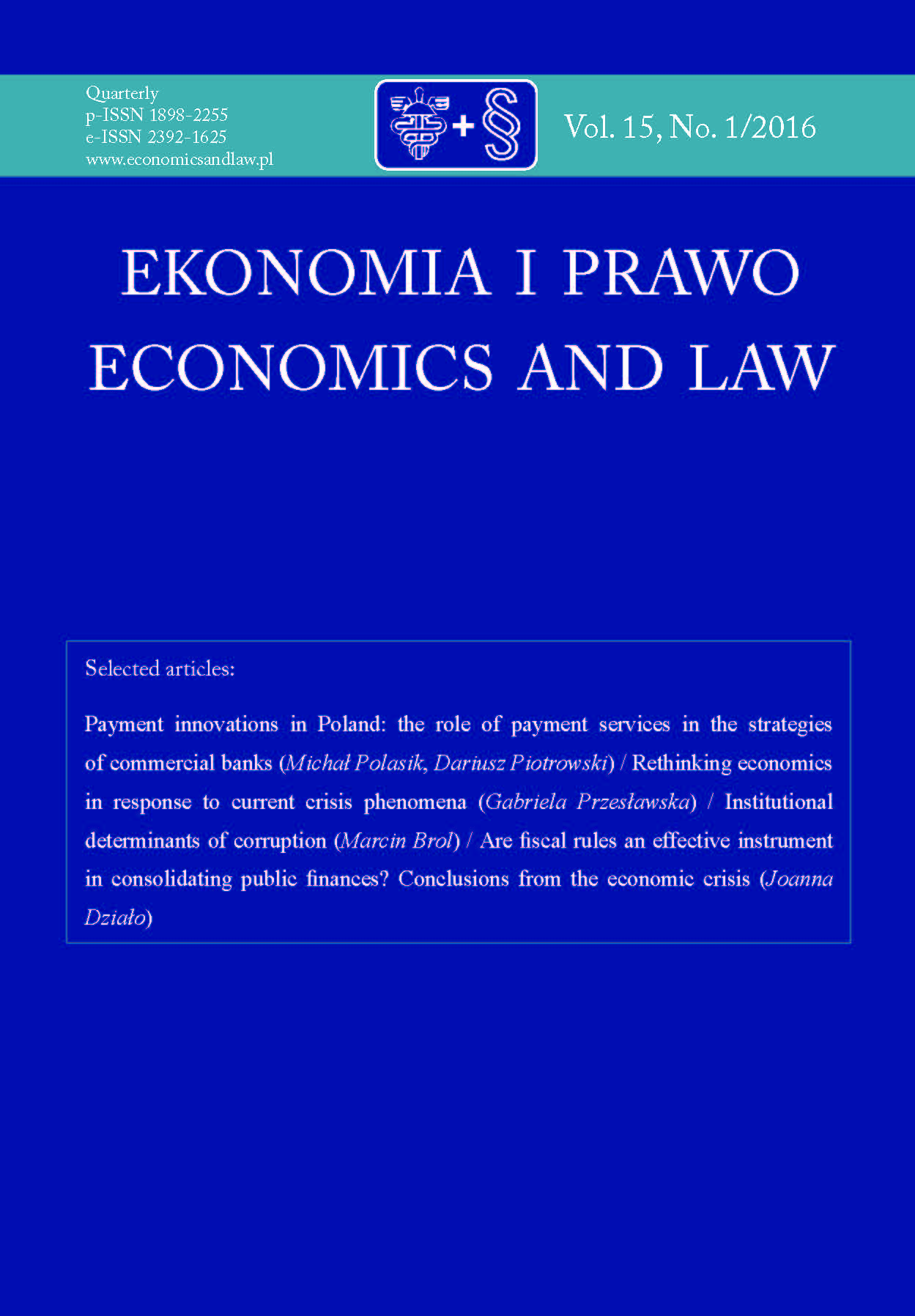RETHINKING ECONOMICS IN RESPONSE TO CURRENT CRISIS PHENOMENA
DOI:
https://doi.org/10.12775/EiP.2016.008Keywords
crisis phenomena, lessons from economic crisis for economics and economic policy, socio-economic development, new role of the state, significance of institutional envi-ronmentAbstract
In seven years from the eruption of a global economic crisis, a noticeable change has taken place in the approach of economists, as well as international economic organisations (i.e. IMF and the World Bank), to analysing the occurring crisis phenomena. A purpose of the article is to present transformation of views and positions of the abovementioned communities in the context of experiences in overcoming crisis and of the modern challenges of post-crisis economy. In this scope, the article shows changes in economic theory and policy and proposals for the new state role, especially emphasizing the significance of institutional environment for socio-economic development. The assumed research task, performed on the basis of a critical analysis of subject’s literature, serves to verify an initial hypothesis of gradual formation of new rules of the game, i.e. institutional order, in the post-crisis world, of which Poland is a part. The postulated institutional order would constitute a connection of social, economic and political aspects. The analysis conducted in the article proved an influence of occurring crisis phenomena on evolution of economic science and policy. In this area, in order to increase explanatory and predictive power of macroeconomics, it is recommended to make use of a more heterodox approach which includes taking into account the financial markets’ behavior and macroeconomic effects of income inequalities. In general, it can be stated that current revaluations in thinking about economy, although being the prerequisites for institutional change, are not of a breakthrough character, so they do not constitute critical junctures in economic development and theory. In this regard, the significance of governments’ political will is emphasized as a basic factor in resolving problems resulting from global economic crisis.
References
Acemoglu D., Robinson J.A, Why Nations Fail: The Origins of Power, Prosperity, and Power, Crown, New York 2012.
Berg A.G., Ostry J.D, Inequality and Unsustainable Growth: Two Sides of the Same Coin?, “IMF Staff Discussion Notes”, Vol. 11, No. 08/2011, http://dx.doi.org/10.5089/9781463926564.006.
Blanchard O., Jaumotte F., Loungani P., Labor Market Policies and IMF Advice in Advanced Economies During the Great Recession, “IMF Staff Discussion Notes”, Vol. 13, No. 02/2013, http://dx.doi.org/10.5089/9781484301289.006.
Blinder A., What Did We Learn from the Financial Crisis, the Great Recession, and the Pathetic Recovery?, “The Journal of Economic Education”, Vol. 46, No. 2/2015, http://dx.doi.org/10.1080/00220485.2015.1015190.
Caballero R., Macroeconomics after the Crisis: Time to Deal with the Pretense — of —Knowledge Syndrome, “Journal of Economic Perspectives”, Vol. 24, No. 4/2010, http://dx.doi.org/10.1257/jep.24.4.85.
Fiedor B., Kryzys gospodarczy a kryzys ekonomii jako nauki, “Ekonomista”, No. 4/2010.
Fiedor B., Uwagi o potrzebie równowagi metodologicznej w ekonomii, “Studia Ekonomiczne”, No. 1/2013.
Godłów-Legiędź J., Współczesna ekonomia. Ku nowemu paradygmatowi, C.H. Beck, Warszawa 2010.
Kingston C., Caballero G., Comparing Theories of Institutional Change, “Journal of Institutional Economics”, Vol. 5, No. 02/2009, http://dx.doi.org/10.1017/s1744137409001283.
Kołodko G.W., Neoliberalizm i światowy kryzys gospodarczy, “Ekonomista”, No. 1/2010.
Krugman P., Zakończcie ten kryzys!, Helion, Gliwice 2013.
Lagarde C., Lifting the Small Boats, https://www.imf.org/external/np/speeches/2015/061715.htm (07.10.2015).
Landmann O., Short-Run Macro After the Crisis: The End of the “New” Neoclassical Synthesis?, “University of Freiburg Discussion Paper Series”, No. 27/2014, https://www.macro.uni-freiburg.de/publications/research_articles_landmann (07.10.2015).
Lipset S.M., Rokkan S.(eds.), Party System and Voter Alignments, Free Press, New York 1967.
Lissowska M., Institutions that Change the World, “Gospodarka Narodowa”, No. 6/2014.
Mączyńska E. (ed.), Ekonomia dla przyszłości. Fundamentalne problemy teorii ekonomii i praktyki gospodarczej, PTE, Warszawa 2014.
Mączyńska E., Współczesne wyznaczniki przemian w systemach społeczno-gospodarczych, [in:] M. Bucka, Z. Mikołajewicz (eds.), Procesy gospodarczego i społecznego rozwoju wobec wyzwań współczesnego świata, Wydawnictwo Uni-wersytetu Opolskiego, Opole 2014.
Mazzucato M., The Entrepreneurial State. Debunking Public vs. Private Sector Myths, Anthem Press, London, New York 2013.
North D.C., Understanding the Process of Economic Change, Princeton University Press, Princeton 2005.
Nuti D.M., Polityka oszczędnościowa a rozwój, [in:] G.W. Kołodko (ed.), Zarządzanie i polityka gospodarcza dla rozwoju, Poltext, Warszawa 2014.
Przesławska G., Ekonomia w czasach kryzysu, [in:] J. Kundera (ed.), Globalizacja, eu-ropejska integracja a kryzys gospodarczy, Instytut Nauk Ekonomicznych Wydziału Prawa, Administracji i Ekonomii Uniwersytetu Wrocławskiego, Wrocław 2011.
Przesławska G., Pokryzysowa rola państwa w gospodarce — nowe kierunki badań podstawowe dylematy, “Polityka Gospodarcza”, No. 22/2014.
Ratajczak M., Ekonomia i edukacja ekonomiczna w dobie finansyzacji, in: E. Mączyńska (ed.), Ekonomia dla przyszłości. Fundamentalne problemy w teorii ekonomii i praktyce gospodarczej, PTE, Warszawa 2014.
Rodrik D., From Welfare State to Innovation State, https://www.project-syndicate.org/commentary/labor-saving-technology-by-dani-rodrik-2015-01?barrier=true (07.10.2015).
Roubini N., Mihm S., Ekonomia kryzysu, Wolters Kluwer, Warszawa 2011.
Spiegler P., Milberg W., Methodenstreit 2011? Historical Perspective on the Contempo-rary Debate Over How to Reform Economics, “Forum for Social Economics”, Vol. 42, No. 4/2013, http://dx.doi.org/10.1080/07360932.2013.814089.
Sroczyński G., Jak pieniądze pustoszą nasz świat, “Gazeta Wyborcza”, 04.04.2015, http://wyborcza.pl/magazyn/1,144507,17699870,Jak_pieniadze_pustosza_nasz_swiat.html (07.10.2015).
Stankiewicz W., Ekonomika instytucjonalna. Zarys wykładu, Wydawnictwo Prywatnej Wyższej Szkoły Businessu i Administracji, Warszawa 2005.
Stasiński M., Marek Belka: Skończmy z kapitalizmem wyczynowym, “Gazeta Wy-borcza”, 18–19.07.2015, http://wyborcza.pl/magazyn/1,146875,18384078,marek-belka-skonczmy-z-kapitalizmem-wyczynowym.html (07.10.2015).
Stiglitz J.E., Freefall. Jazda bez trzymanki. Ameryka, wolne rynki i tonięcie gospodarki amerykańskiej, PTE, Warszawa 2010.
Tanzi V., Polityka fiskalna na rzecz przedsiębiorczości i sprawiedliwego wzrostu, [in:] G.W. Kołodko (ed.), Zarządzanie i polityka gospodarcza dla rozwoju, Poltext, Warszawa 2014.
Tokarski J. (ed.), Słownik wyrazów obcych, PWN, Warszawa 1980.
Wojtyna A., Czy kryzys w teorii ekonomii jest głębszy niż w gospodarce?, “Ekonomista”, No. 2/2014.
Woś R., Więcej państwa proszę!, http://www.obserwatorfinansowy.pl/tematyka/makroekonomia/wiecej-panstwa-prosze (07.10.2015).
Żakowski J. (ed.), Reforma kulturowa 2020–2030–2040. Sukces wymaga zmian, http://www.kig.pl/files/Aktualnosci/KIG_RAPORT.pdf (07.10.2015).
Downloads
Published
How to Cite
Issue
Section
Stats
Number of views and downloads: 695
Number of citations: 0
